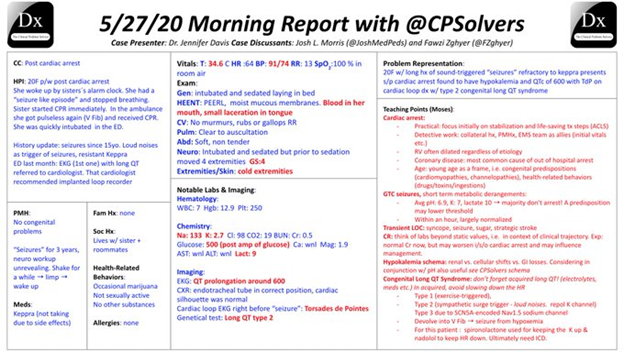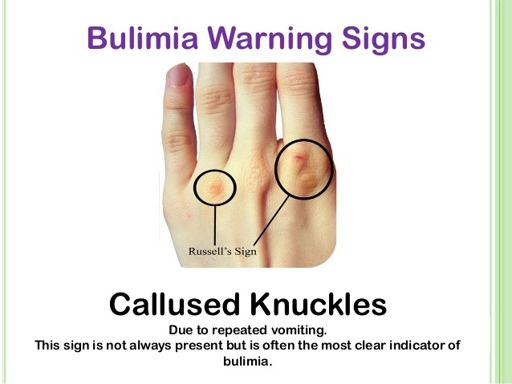Time for some #SpacedRepetition: @CPSolvers May 27th Day 57: http://bit.ly/36z9FFE
Chat">https://bit.ly/36z9FFE&q... recap of the #ClinicalPearls #VirtualMorningReport w/ @sargsyanz @StephVSherman
Shoutout to @JoshMedPeds & @FZghyer @DxRxEdu @rabihmgeha
Learning points courtesy of @haematognomist
Chat">https://bit.ly/36z9FFE&q... recap of the #ClinicalPearls #VirtualMorningReport w/ @sargsyanz @StephVSherman
Shoutout to @JoshMedPeds & @FZghyer @DxRxEdu @rabihmgeha
Learning points courtesy of @haematognomist
Let& #39;s start with a problem representation:
A 20 y/o F presents w/ PMH of sz d/o on keppra s/p "seizure like" episode https://abs.twimg.com/emoji/v2/... draggable="false" alt="▶️" title="Right-pointing triangle" aria-label="Emoji: Right-pointing triangle">cardiac arrest with bystander CPR and developed ROSC w/ EMS found to have a tongue laceration on exam w/ labs
https://abs.twimg.com/emoji/v2/... draggable="false" alt="▶️" title="Right-pointing triangle" aria-label="Emoji: Right-pointing triangle">cardiac arrest with bystander CPR and developed ROSC w/ EMS found to have a tongue laceration on exam w/ labs  https://abs.twimg.com/emoji/v2/... draggable="false" alt="▶️" title="Right-pointing triangle" aria-label="Emoji: Right-pointing triangle"> hypoK and
https://abs.twimg.com/emoji/v2/... draggable="false" alt="▶️" title="Right-pointing triangle" aria-label="Emoji: Right-pointing triangle"> hypoK and  https://abs.twimg.com/emoji/v2/... draggable="false" alt="⏫" title="Up-pointing double triangle" aria-label="Emoji: Up-pointing double triangle"> qTC & Torsades on event monitor
https://abs.twimg.com/emoji/v2/... draggable="false" alt="⏫" title="Up-pointing double triangle" aria-label="Emoji: Up-pointing double triangle"> qTC & Torsades on event monitor
A 20 y/o F presents w/ PMH of sz d/o on keppra s/p "seizure like" episode
Cardiac arrest in a 20 y/o, drugs vs structural heart disease vs arrhythmias (congenital long QT, electrolytes)
"Ts” & “Hs” causes (hypoxia, hypokalaemia/hyperkalaemia, hypothermia/hyperthermia, hypovolaemia, tension pneumothorax, tamponade, thrombosis, toxins)
"Ts” & “Hs” causes (hypoxia, hypokalaemia/hyperkalaemia, hypothermia/hyperthermia, hypovolaemia, tension pneumothorax, tamponade, thrombosis, toxins)
Also want to know what was she doing prior to arrest. IF she was working out think HOCM
Important to know the initial rhythm, VFib/VTach vs PEA/asystole. It is not only prognostic sign but treatments change
Fam hx important in 20 year olds - not 80 year olds
Important to know the initial rhythm, VFib/VTach vs PEA/asystole. It is not only prognostic sign but treatments change
Fam hx important in 20 year olds - not 80 year olds
Here is a nice summary on post-arrest syndrome
https://litfl.com/post-resuscitation-syndrome/
Arrhythmogenic">https://litfl.com/post-resu... right ventricular cardiomyopathy as well. https://pubmed.ncbi.nlm.nih.gov/29158215/
electrolyte">https://pubmed.ncbi.nlm.nih.gov/29158215/... abnormalities, Brugada/Arrhythmogenic right ventricular dysplasia, collagen vascular disease causing dissection
https://litfl.com/post-resuscitation-syndrome/
Arrhythmogenic">https://litfl.com/post-resu... right ventricular cardiomyopathy as well. https://pubmed.ncbi.nlm.nih.gov/29158215/
electrolyte">https://pubmed.ncbi.nlm.nih.gov/29158215/... abnormalities, Brugada/Arrhythmogenic right ventricular dysplasia, collagen vascular disease causing dissection
Channelopathies could certainly do it --> seizure + long QT
Long QT is classically associated with sudden startles
Seizure or syncope...that& #39;s the big question here
but channelopathies can be subcategorized by the type of channel is involved.
Long QT is classically associated with sudden startles
Seizure or syncope...that& #39;s the big question here
but channelopathies can be subcategorized by the type of channel is involved.
the K+ channels are more arrhythmogenic. Na+ channels cause more seizure (e.g. Dravet syndrome)
Post arrest need to start hypothermia/normothermia protocol is the most important 34-36C is the target
SUDEPS: It’s the leading cause of epilepsy related death.
Post arrest need to start hypothermia/normothermia protocol is the most important 34-36C is the target
SUDEPS: It’s the leading cause of epilepsy related death.
SUDEPS: Sudden unexpected death in epilepsy is a sudden unexpected mortality in otherwise healthy patients w/ epilepsy w/or w/or evidence of a seizure & excluding documented status, in which postmortem examination does not reveal a cause of death. https://www.ncbi.nlm.nih.gov/pmc/articles/PMC5034868/">https://www.ncbi.nlm.nih.gov/pmc/artic...
A single fav article of mine that talks about SUDEP and cardiac channelopathies
https://pubmed.ncbi.nlm.nih.gov/31353444/
A">https://pubmed.ncbi.nlm.nih.gov/31353444/... high lactic after seizures, NEJM https://www.nejm.org/doi/full/10.1056/NEJM197712152972417
Severe">https://www.nejm.org/doi/full/... metabolic acidosis after a single tonic‐clonic seizure. https://onlinelibrary.wiley.com/doi/full/10.1111/j.1365-2044.2005.04245.x">https://onlinelibrary.wiley.com/doi/full/...
https://pubmed.ncbi.nlm.nih.gov/31353444/
A">https://pubmed.ncbi.nlm.nih.gov/31353444/... high lactic after seizures, NEJM https://www.nejm.org/doi/full/10.1056/NEJM197712152972417
Severe">https://www.nejm.org/doi/full/... metabolic acidosis after a single tonic‐clonic seizure. https://onlinelibrary.wiley.com/doi/full/10.1111/j.1365-2044.2005.04245.x">https://onlinelibrary.wiley.com/doi/full/...
if she has McConnell& #39;s sign think PE, https://blog.5minsono.com/mcconnells-sign/
https://blog.5minsono.com/mcconnell... href=" https://pubmed.ncbi.nlm.nih.gov/7487261/ ">https://pubmed.ncbi.nlm.nih.gov/7487261/&... --> tongue biting value in seizures : 99% spec but something like 20% sens
echocardiogram can miss HOCM, sometimes need a cMRI
echocardiogram can miss HOCM, sometimes need a cMRI
Out of hospital cardiac arrests have a poor mortality, Studies show survival rate to hospital discharge <10% &those with good neurological status < 3%. https://pubmed.ncbi.nlm.nih.gov/28680517/
CTbrain">https://pubmed.ncbi.nlm.nih.gov/28680517/... post-arrest: if white-gray matter blurring then down time may be significant & poor prognosis
CTbrain">https://pubmed.ncbi.nlm.nih.gov/28680517/... post-arrest: if white-gray matter blurring then down time may be significant & poor prognosis
Postcardiac arrest myocardial dysfunction
Although the heart initially becomes hyperkinetic, likely due to circulating catecholamines, global hypokinesis often follows
Usually resolves within 72 hours
Systemic ischaemia/reperfusion response...
Although the heart initially becomes hyperkinetic, likely due to circulating catecholamines, global hypokinesis often follows
Usually resolves within 72 hours
Systemic ischaemia/reperfusion response...
...The response of the body is similar to the septic shock with activation of the immune and complement systems, and release of inflammatory cytokines and a wide range of cellular responses
Hypothermia on ECG https://abs.twimg.com/emoji/v2/... draggable="false" alt="▶️" title="Right-pointing triangle" aria-label="Emoji: Right-pointing triangle">Osborne wave https://www.ncbi.nlm.nih.gov/pmc/articles/PMC1989774/">https://www.ncbi.nlm.nih.gov/pmc/artic...
https://abs.twimg.com/emoji/v2/... draggable="false" alt="▶️" title="Right-pointing triangle" aria-label="Emoji: Right-pointing triangle">Osborne wave https://www.ncbi.nlm.nih.gov/pmc/articles/PMC1989774/">https://www.ncbi.nlm.nih.gov/pmc/artic...
Hypothermia on ECG
U can see ekg changes with cooling and also electrolyte abnormalities - most significantly hypokalemia
intracellular shift if she is being cooled
Prolonged QTC? sorry correct the QT** Bazet is less than ideal.
A #MedTweetorial by @DoctorVig https://twitter.com/DoctorVig/status/1265741266060546048">https://twitter.com/DoctorVig...
intracellular shift if she is being cooled
Prolonged QTC? sorry correct the QT** Bazet is less than ideal.
A #MedTweetorial by @DoctorVig https://twitter.com/DoctorVig/status/1265741266060546048">https://twitter.com/DoctorVig...
I wonder if it& #39;s 1) Seizure causing cardiac arrest 2) cardiac causing seizure-like episodes 3) underlying condition causing both seizure and cardiac or 4) seizure unrelated to current
if you have difficulty raising K, then empiric Mg will often help despite a normal Mg level
if you have difficulty raising K, then empiric Mg will often help despite a normal Mg level
long qtc = hypok, hypoCa, Hypomagnesemia
The anion gap is likely transient secondary to the seizure and elevated lactic
Hyperventilation https://abs.twimg.com/emoji/v2/... draggable="false" alt="▶️" title="Right-pointing triangle" aria-label="Emoji: Right-pointing triangle"> transient hypoCa as the Protons jump off alb to keep pH normal and the subsequent negative charge on the albumin grabs the Ca from serum
https://abs.twimg.com/emoji/v2/... draggable="false" alt="▶️" title="Right-pointing triangle" aria-label="Emoji: Right-pointing triangle"> transient hypoCa as the Protons jump off alb to keep pH normal and the subsequent negative charge on the albumin grabs the Ca from serum
The anion gap is likely transient secondary to the seizure and elevated lactic
Hyperventilation
The impact of hypothermia on serum potassium concentration: A systematic review. https://www.resuscitationjournal.com/article/S0300-9572(17)30284-8/fulltext
was">https://www.resuscitationjournal.com/article/S... checked for Russell sign?
was">https://www.resuscitationjournal.com/article/S... checked for Russell sign?
Huge fan of albumin in all pts atleast so I know what to do with their possible gap or non-gap.
Low albumin in a pt can "mask" presence of unmeasured organic acids
usually QT prolonging meds are SSRI, antipsychotic, antifungals, floroquinolones, macrolides etc
Low albumin in a pt can "mask" presence of unmeasured organic acids
usually QT prolonging meds are SSRI, antipsychotic, antifungals, floroquinolones, macrolides etc
People with LQTS often show a prolonged Q-T interval during exercise, intense emotion (such as fright, anger, or pain), or as a reaction to a loud or startling noise.
People with LQTS have usually had at least one episode of fainting by the time they are 10 years old.
People with LQTS have usually had at least one episode of fainting by the time they are 10 years old.
Congenital Long QT Syndrome. a review. https://pubmed.ncbi.nlm.nih.gov/18606002/
Jervell">https://pubmed.ncbi.nlm.nih.gov/18606002/... Lange- hearing loss + Long QTc
Romano ward- Long QTc without hearing loss and episodes of sudden falls
This is a Peds review is a nice breakdown of pediatric syncope, https://pedsinreview.aappublications.org/content/21/11/384">https://pedsinreview.aappublications.org/content/2...
Jervell">https://pubmed.ncbi.nlm.nih.gov/18606002/... Lange- hearing loss + Long QTc
Romano ward- Long QTc without hearing loss and episodes of sudden falls
This is a Peds review is a nice breakdown of pediatric syncope, https://pedsinreview.aappublications.org/content/21/11/384">https://pedsinreview.aappublications.org/content/2...
long QT syndrome presenting as seizure disorder - https://emj.bmj.com/content/22/8/600
https://emj.bmj.com/content/2... href=" https://pubmed.ncbi.nlm.nih.gov/27466471/ ">https://pubmed.ncbi.nlm.nih.gov/27466471/... --> long QT + seizures and genetic biomarkers
LQT1 = KCNQ1 (K+ rectifier) channel
LQT2 = KCNH2 (hERG, delayed rectifier K+) channel
LQT3 = Na channel, https://www.ncbi.nlm.nih.gov/pmc/articles/PMC5840852/">https://www.ncbi.nlm.nih.gov/pmc/artic...
LQT1 = KCNQ1 (K+ rectifier) channel
LQT2 = KCNH2 (hERG, delayed rectifier K+) channel
LQT3 = Na channel, https://www.ncbi.nlm.nih.gov/pmc/articles/PMC5840852/">https://www.ncbi.nlm.nih.gov/pmc/artic...
There are tons of drugs inhibit the hERG channel —> drug-induced/acquired long QTS
in congenital long QT, give BB paradoxically as
long QT can be brought out by exercise
Just please make sure when your ECG says long qt, please calculate it on your own https://www.mdcalc.com/corrected-qt-interval-qtc">https://www.mdcalc.com/corrected...
in congenital long QT, give BB paradoxically as
long QT can be brought out by exercise
Just please make sure when your ECG says long qt, please calculate it on your own https://www.mdcalc.com/corrected-qt-interval-qtc">https://www.mdcalc.com/corrected...
@GurleyGuy @JoshMedPeds @AndreaAnampaG @AnthonyPensa @Lakh_malla @PGuptaMD @YihanYangMD @DanielCLiauw @ASanchez_PS @abeljosephmd @brentchammd @AndreaAnampaG @this_is_svenka @SurajNagaraj @dminter89 @Doc_Fomin @AnnKumfer @DoubleDawgMD @Anand_88_Patel @MikeRoseMDMPH @haematognomist
@MDColl90 @matstomato @AnandJag1 @StephVSherman @MargaretL16 @aoglasser @ETSshow @gradydoctor @MohitHarshMD @HannahRAbrams @SmithaGaneshan @jackpenner @TheRealDSrini @mattsakumoto @medrants @rachelbigley1 @k_vaishnani @Meerkatmirson @matstomato @zoyaqureshy @tony_breu @ddeng_22
@Sharminzi @ArsalanMedEd @NishaSunkuMD @ecvasti @JonathanRyderMD @RezidentMD @GurleyGuy @appyjumpindaze @justalisongrace @davidthlam @bethgay45 @BrandonKinneman @rongejman @BryanCUlrich @victorekuta @danaamara1 @NishaSunkuMD @pri_athavale @BhavyaVarma12 @sargsyanz @StephVSherman

 Read on Twitter
Read on Twitter



